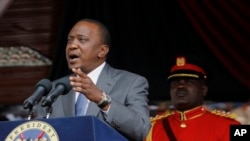Kenya has launched its first-ever diaspora policy, to encourage investment, keep track of Kenyans abroad and involve them in the country’s development, but members of the diaspora have concerns about the policy.
When Kenyan President Uhuru Kenyatta announced at the end of January the creation of a new national policy aimed at managing the country’s diaspora, millions of Kenyans around the world sat up and took notice.
Like many African countries, Kenya’s diaspora is extensive - an estimated 3 million Kenyans live abroad. And like many African economies, Kenya’s has long been subsidized by their remittances. These amounted to about $1.3 billion last year, according to the Central Bank of Kenya.
African governments rarely make a point of engaging their diasporas directly. But as Kenyatta said at the policy’s launch in January, Kenyans abroad have the potential to contribute to the country’s development.
“Given the abundance of skilled, knowledgeable and patriotic Kenyans outside our borders, it is now a matter of the highest priority to integrate the diaspora into our national development agenda,” the president said.
Feelings about policy
But Kenyans living in the diaspora have mixed feelings about the new policy.
Comfort Mwangi runs the Confederation of Kenya Diaspora Organizations from Jacksonville in the southern U.S. state of Florida.
Mwangi says many Kenyans abroad have felt marginalized by the Kenyan government, including during Kenyatta’s recent visit to the United States.
“The president talked to us as a group, as a diaspora, and he told us one or two things. But when it came to serious matters, he had a meeting with Americans our age and gave them opportunities. We need to be treated the same. We’d like to see more to it that they include us," she says
Benson Kakui, who lives in Dallas, in the southwestern U.S. state of Texas, agrees that the policy is a step in the right direction. He welcomes its focus on investment opportunities, saying many Kenyans face difficulties investing back home.
But the policy also involves keeping track of Kenyans abroad and keeping a database of their details. This, Kakui says, has some people worried.
“When you are giving the government your information, you don’t know what this can be used for. That’s a fear. Some of the reason why people did not register, frankly, was because of that. They are fearful that ‘Hey, the government is keeping track of me, they know where I am, and why do they want to know?’ " he says.
When it comes to promoting Kenya’s interests abroad - another part of the policy - many in the diaspora say they are glad to help.
Tourism advocate
John Gachago in Gainsville, Florida says he already does his part to boost Kenyan tourism.
“When my neighbor comes and talks to me about, ‘Hey, I hear Kenya’s a great place, they’ve got great coffee,’ I say, ‘Yeah, you’ve got to go visit! You’ve got to go on a safari! You’ve got to go try our coffee!’ I absolutely would do that, even without being paid for it. I love my country that much," Gachago says.
But if the Kenyan government sees the diaspora simply as a giant pool of free cash, they are wrong, Mwangi says. The money sent home may be a sign of love, but it is also a sign of the government’s own failure to provide for its people, she adds.
“We send money for somebody to go to hospital, for someone to get married, some tuition, and that kind of a thing. The government thinks we’re seated all together and throwing 119 billion shillings to them. We’re not. Where the government has failed, we’re filling in those holes with remittances. That’s how they should see it," she says.
Engaging the diaspora can only be a good thing, Mwangi says. But for Kenya to depend too heavily on their remittances, she adds, would be a mistake.




